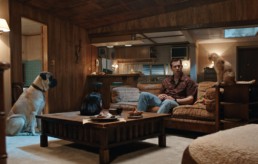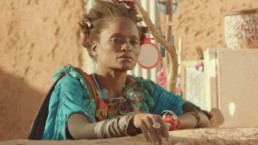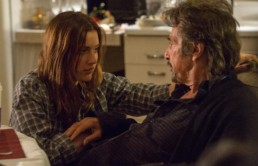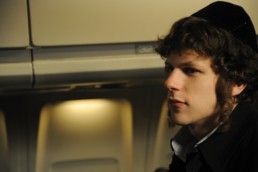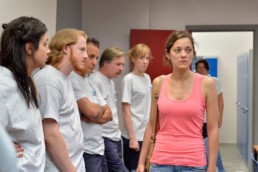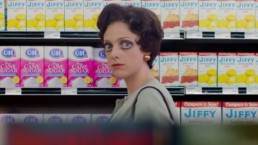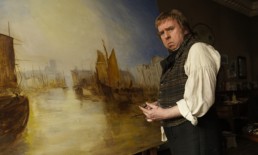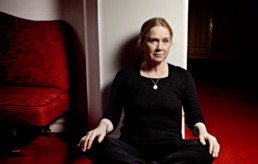Review: 'The Voices'
It may be an easy hit to make, but in The Voices, Ryan Reynolds, a nice but disturbed guy who listens to his demonic pets' demonic advice to kill people, should have listened to the voice in his head that might have better dissuaded him from putting himself in this dud of a comedy (and you should heed this voice’s warning too, whether or not you decide to go in). Jerry (Reynolds) is a hapless yet chipper packing and shipping worker at a fixtures factory (really, a toilet factory), resigned to a job and life that’s really (sigh,) in the crapper. He has a few early issues that would plague any young, awkward introvert: he yields a work-place love for the hot English worker in accounting, Fiona (Gemma Arterton), and when he gets home, unloads his day to his cat and dog. Past the point of merely talking to them, however, the pets converse back, with the opposing moral viewpoints that serve as angel-and-demon consciences that steer stupid Jerry this way and that through a series of calamitous, stupid, and dark decisions that bring him into the role of a killer. The Voices is dumb, base-level humor, that may have enough of an inherently entertaining premise, but will end up separating those who are entirely offended by its gross-out comedy intentions and those who are happy to bumble through its series of many crude offerings, and there may be a much more resounding number in the former camp.
Written by Michael R. Perry (Paranormal Activity 2) and directed by Marjane Satrapi (Persepolis), The Voices feels sufferable from the get-go. Jerry, upon given the opportunity to host the company picnic, finally finds his chance to connect with Fiona, and soon enough, musters the courage to ask her out; he relays this good news back to Mr. Whiskers, the nefariously-minded Irish cat and Bosco, the dopey but morally centered dog (both are voiced by Reynolds, and a handful of other animals, with the same mediocre voice-work). But during the pair’s drive to their date, he smashes into a crossing deer–blood and glass through his windshield and washing over them both. And don’t forget, Jerry can talk to animals, so the deer, in a painfully obscene gesture, begs Jerry to put him out of his misery. Jerry slices the fallen animal’s throat in blood-spurting fashion, leading Fiona to run away in shrieking terror. And stupid Jerry runs confused after her, with the knife, and mistakenly falls on to her, cueing a moment that is supposed to lend itself to humor, but results in an objectively WTF moment that sets the stage for the rest of the film. From here, Jerry racks up more voices in his head that all try to persuade him to kill, kill, kill, so he won’t feel alone, or something.
This schlock-comedy won’t get a pass for having an inexcusably and barely funny script or barely interesting story.
Another point of the movie’s oddness comes in seeing the familiar face Anna Kendrick as Lisa, a co-worker who holds a crush on the perceived to be nice guy Jerry. Her inclusion in the film as a second act love interest, which also introduces serious-meaning flashbacks of Jerry’s scarring childhood, where he is seen needing to talk to sock-puppets for emotional catharsis, shows just how misaligned the movie’s intentions of being all things ends up being. Jacki Weaver as Jerry’s psychiatrist makes for solid casting, but again, everything that isn’t all-out bonkers derails the already shaky premise from excelling at even that.
Stylistically, it’s made and chopped up with the intention of being a dark and cult movie; though this schlock-comedy won’t get a pass for having an inexcusably and barely funny script or barely interesting story. Much more deserving cult-comedies earn their spot nestled in amongst gross-out times with friends by pulling out all the stops and centering their entire philosophy behind the one absurd idea. The Voice's biggest crime here in this brutal outing is that, as a story about a guy who talks to his pets and the severed heads of his victims, it all the while attempts to hang on to a thread of somber back-story, of Jerry’s traumatizing childhood, that led him to be this way. And it’s still one heck of a seismically-stupid movie. It’s not even surprising when the final credits roll and the cast sings and dances directly into the camera as the movie's finale ending number, a self-aware nudge at the absurdity of the whole thing that only drives the final nail into this film’s coffin.
The Voices does not hold enough relevancy or fun times to warrant a watch, and it’d be assumed that Reynolds and company wouldn’t beg you to go out of your way to see it. Premiering at 2013’s Sundance Film Festival, the flick may have garnered early festival-high buzz, but its early February release should show that it’s back-burner material getting scraped off the slate. Unfortunately, Reynolds might have to suffer through more poor-project centered-reviews, if this even registers high enough on anyone’s radars before getting put to sleep.
https://www.youtube.com/watch?v=2fKu_NMbNKM
Review: 'Timbuktu'
Living in such modern times, one can sometimes feel the simultaneously-conflicting feelings of being at once incredibly connected to, as well as entirely disconnected from, our species as a whole. This global village reads headlines and news stories that clue us in, keep us updated on current affairs, tragic and otherwise. Timbuktu, an Academy-Award nominee for Best Foreign Language Film (the official Mauritania entry) from director Abderrahmane Sissako, successfully brings the exotic landscape and culture of Jihadist occupied Timbuktu to incredible first-world relevancy, showing terror-born unrest through the eyes of everyday, dignified, Islamic people.
Timbuktu, at only a brisk ninety-seven minutes long, moves with a measured stillness, like specs of sand tumbling silently along through the film's vast desert landscapes, to achieve arresting viewing. In a small village, we see a small band of Jihadist rebels enter Timbuktu (shot in Mauritania, for safety purposes), and begin to impose their own self-rule amongst the people: cigarettes, football, even music are outlawed– not in shouting rage or wild caricature, but rather, with the sort of controlled, direct tone of truer fear and imposition.
Timbuktu is that rare film, an important film that, through thoughtful, insightful, and heartfelt film-making, humanizes a tragic story of this modern culture.
Outside of the small city and its imposed rule by the extremists, a local cattle herder Kidane (Ibrahim Ahmed aka Pino) lives peacefully in the sand dunes with his wife Satima (Toulou Kiki), his daughter Toya (Layla Walet Mohamed), and Issan (Mehdi Ag Mohamed), their twelve-year-old shepherd. Kidane's pleasures consist of only seeing his family’s faces, especially that of his young daughter Toya, wide-eyed and beautiful. So when the loss of a calf at the hand of young Issan leads to a confrontation gone wrong with Kidane and an imposing fisherman, Kidane is removed from his family, leading to his fate being decided by the Islamic rebels who capture him in the city. A brilliantly woven storyline that organically merges to capture an entire landscape of oppressed life, we as the audience are treated with an experience of seeing first-hand the plight and oppression of these people, standing in direct contrast to the willful rebels that aim to rule them.
Of exceptional note is the confident directing on display. Life here in Timbuktu is shown as observed in the tradition and religious culture that dictates normal life, seen praying in mosques and praising Allah in respectful observance. The most successful aspect of the film, separate from the artistry, is with the dueling circumstances and practices of the Islamic people and the extremists who twist and bend religion to their will. In a scene, a rebel sits down with a local mother and daughter, and, with a translator (language barriers separate the rebels even further from the Islamic people and their philosophies) requests to marry her. When his offer is denied in a dignified manner, he assures in measured yet direct tone that the next time he asks, it will be in an aggressive way, to which she accepts with solemn grace. Sissako’s biggest achievement is giving back the humanity to a people and culture that, in headline news, can make us forget that we share collectively as a human race.
Timbuktu is that rare film, an important film that, through thoughtful, insightful, and heartfelt film-making, humanizes a tragic story of this modern culture. A beautifully made and haunting film (with gorgeous camerawork by Blue is the Warmest Color cinematographer Sofian El Fani) that is truly impactful, Timbuktu will stay in the minds of audiences to come.
https://www.youtube.com/watch?v=CspcDYQ-SiY
Review: 'The Humbling'
The Humbling may allude to how former fictitious movie and stage actor Simon Axler (Al Pacino), on the other side of sixty, witnesses his own fall from grace during a theatrical run of King Lear, and that same sentiment is channeled and seeped into the movie itself; mostly. While Pacino hams it up in his own wide eyed despondence and delusion, the comedy and effort here, directed by Barry Levinson (Rain Man, Good Morning Vietnam) based on the novel from Philip Roth, makes for off-kilter entertainment that's as manic and varied as Pacino's persona himself (and audiences will receive or dismiss it based on that alone).
The film begins backstage in the mirror of a make-up counter, which sees Axler penciling in his grayed goatee while losing himself in Shakespeare ("All the world's a stage..."). The initial sequence sets up what is to be the focus of the movie, what every scene, shot, and performance choice is reaching for- hand outstretched towards the golden ring: the bruising story of a man coming to terms with his life, and how indistinguishable his life may be compared to his life of invent and make-pretend. It goes to the point that actors are apparently the most existentially conflicted with the most soul-torching of personal missions to sort out their life's meaning through art, which here, has become a worm-hole of self-reflexiveness that sees Axler attempt suicide, enter a self-help program, and begin an affair with a woman (further: lesbian) half his age (Greta Gerwig).
The initial sequence sets up what is to be the focus of the movie, what every scene, shot, and performance choice is reaching for- hand-outstretched towards the golden-ring: the bruising story of a man coming to terms with his life, and how indistinguishable his life may be compared to his life of invent and make-pretend.
The weightiness of such an emotionally taxing plot may sound boorish and clunky, which again, it kind of is. While it can be safely stated that it's become something of old-hat to see Pacino in a rabid-dog mania in his performances, his indulgence is leveraged in good spirits here. Although the film's go-to move is seeing a weathered Axler, sitting in some sort of chair (cushioned or otherwise), slumped over in inner-monologue soliloquy, the whole thing is composed with enough free-form composition that it at least never loses you in total abstraction, even when things get weird.
And weird things get. With Axler's spiral into solitary living in a reclusive mansion, with tele-video sessions with a therapist (Simon Baker), he is soon visited by an old friend–who is not old herself, but rather, a family friend's daughter, Pegreen, who once fostered a crush for her father's friend, but is now herself edging forty. Oh, and she's in a relationship with a woman, but it doesn't matter, apparently, because she soon enough throws herself on him, and the two begin a relationship that's depicted as more sincere then creepy. Gerwig is great here, giving her dose of pixie-girl next door sprinkling to the absurdity of it all. Oh, and there's a sub-plot about a woman that Axler meets, Sybil (Nina Arianda) in self-help that asks Axler to help kill her ex-husband. There are actually a few more sub-plots that fall flat and fast, but oddly enough add to the movie's frantic headspace.
While many reviews will mention the striking similarities between this and fellow dip-into-surrealism art-as-life story Birdman, it's to The Humbling's credit that it will be remembered for its own take on the subject matter; however out-there it might be.
https://www.youtube.com/watch?v=kMBbt1JXCkQ
Review: 'Holy Rollers'
Originally premiering in 2010 at the Sundance Film Festival where it also received a Grand Jury Prize nomination (the fest's highest honor), the Jesse Eisenberg-starring Holy Rollers, based off of true events where, in 1998, one million ecstasy pills were smuggled into the US, makes its free VOD debut today exclusively on SnagFilms (the award-winning social video-viewing platform and 2014 Webby® nominee) and all supported devices, including their multi award-winning app.
Flashback to five years ago and Jesse Eisenberg would soon make his star-making turn in the Academy-Award Best Picture nominee, The Social Network. However, before he would receive his Best Actor nomination for playing Mark Zuckerberg, a mild-mannered man whose drive and obsession for success leads to turbulent consequences, Eisenberg would showcase another performance as a mild-mannered man whose drive and obsession for success leads to turbulent consequences.
The main tension in the movie comes from Sam's commitment to his religion, community, family, and ultra-orthodox lifestyle that stands in stark contrast to the late-night, drug dealing and partying scene.
Here, Eisenberg plays Sam Gold, a young Rabbinical student from an ultra-Orthodox Jewish community in Borough Park, Brooklyn. Sam is a caring young man, who is seen doing right by his family and church. His good intentions are shown by him working with his father in a family-owned fabric shop, where Sam's impulse to bargain with customers for his best deal is dismissed by his father, showing initial hints of big money ambitions as well as frustrations that stop him from receiving that. So when the opportunity comes up to turn a quick buck, Sam and his best friend Leon (Jason Fuchs) accept a job from Leon's brother Yoseph (Justin Bartha) to retrieve a suitcase in Amsterdam and walk it through customs in New York. The fact that the suitcase is revealed to carry pure MDMA (ecstasy) only deters Leon, while Sam continues to smuggle the pills, much to the imminent danger that soon spirals out of control.
Holy Rollers is a well-made movie that tells this incredible true story in a very personal way. The main tension in the movie comes from Sam's commitment to his religion, community, family, and ultra-orthodox lifestyle that stands in stark contrast to the late-night, drug dealing and partying scene. To see Sam, in his traditional suit, fedora, and payot (hair ringlets), tagging along on drug deals, in night clubs, and other party scenes, is a large part of what makes this movie work. Director Kevin Asch successfully shows the arc of Sam's transformation, from a well-intentioned family man who abides to not shaking hands with a woman out of respect to an unapologetic drug-dealer that falls for his new boss' girl and more.
Holy Rollers takes the classic story of a guy getting in over his head with a fast and rough situation and gives it a unique treatment. Although the film sags at times and could afford to explore the bigger threats of the drug-dealing/rave-centric world, the movie is a great watch with a great performance by Eisenberg.
Holy Rollers is available to stream now at SnagFilms.com.
https://www.youtube.com/watch?v=9OrjeUDYIc4
Review: 'Two Days, One Night' ('Deux jours, une nuit')
Imagine yourself in this situation: you've recently been let go from your full-time job, but there is a way to save it–you have to convince the majority of your fellow co-workers to forego their newly received bonuses to bring your back. Do you think two days and one night is long enough to make that happen?
This is the premise for the new film, aptly titled, Two Days, One Night (Deux jours, une nuit), directed by socially-conscious filmmakers Jean-Pierre and Luc Dardenne, known also as the sibling directing team the Dardenne Brothers.In it, a worker, Sandra (Marion Cotillard), returns to work after an illness, only to learn that the company has realized that they can operate with one less employee–and that she is to be let go; unless, that is, a Monday-morning vote from the workers sees that they have changed heir minds and decided to bring her back and deny their new bonuses. While entirely simplistic in plot (it is assembled in numerous one-take sequences), its feel and reach extends deeply and intimately into humanistic storytelling which makes for an arresting experience.
While entirely simplistic in plot, its feel and reach extends deeply and intimately into humanistic storytelling which makes for an arresting experience.
With their earliest shared roots in documentary film-making, the Belgian-born Dardenne brothers have unarguably perfected their inspired style of Cinéma vérité (truthful cinema). The Dardennes, with a socially conscious and politically-aware portrayal of lower-middle class people in their movies, ranging from 2002's The Son, 2005's L'enfant, and 2011's The Kid With a Bike, masterfully show how a working class people is subjected to larger cultural economies and institutions that suppress them. The result is watching a movie that feels entirely made up of stolen moments, of captured truths, and here, about humans existing in a flawed society that reveals how the human spirit that can be so suffocated and stifled.
Helming this demanding endeavor is Academy Award-winner Marion Cotillard as Sandra, whose uphill emotional battle throughout the entirety of the movie reveals the actress's most stripped down and undeniable talents. Beyond her struggle to meet individually with her dozen-plus co-workers over one weekend's time, Sandra also suffers from depression, and cripplingly so. Meeting with each new character, and with that, each new emotional realization and encounter, Sandra's bouts of lapsing into weeping, hysterical, and exhausting sadness, resonate painfully with the audience by Cotillard's commitments. The mother of two and spouse of supportive Manu (Fabrizio Rangione), she truly shines here and captures an honesty that keeps the simple storyline mesmerizing. In fact, Two Days, One Night marks the first major film from the Dardenne's to feature an "A-list" actor–and it is to the credit of the filmmakers and actors alike that the result is one that showcases why no other players could have made as affecting a film.
Two Days, One Night is similar and reminiscent of, yet might not fall in line with the Dardenne's other, more urgent and repeatedly "watchable" films, but this one has a spark all its own, for which it should be no doubt be celebrated. They are true masters of their craft, delivering small yet masterfully told stories about the human spirit.
https://www.youtube.com/watch?v=Tb3zBq6gVRk
Review: 'Big Eyes'
People are strange- you're either strange for acknowledging your intrinsic weirdness, which runs directly opposite to that of the social norm's flow, or by failing to acknowledge it; and it always falls between those two parameters. And although pop-goth movie director Tim Burton is revered by this modern culture for making Halloween-hip horror flicks for outsider-teens, his latest movie, Big Eyes, is weird- and for reasons beyond the director's intentions or control.
Following his most recent live-action Johnny Depp-starrer Dark Shadows (2012), Burton side steps the re-make game but keeps the swinging-sixties cool in bringing this real-life story of American painters Walter and Margaret Keane to the big screen. Their shared story, of how together they duped the art world at large into believing that Margaret's non-anachronistic paintings of portraits with hauntingly bulging eyes were envisioned and made by her fraud of a husband, is already so wild and out there that it feels like prime fodder for Burton to dismantle and reconfigure as a delicious piece of absurdist art. The weird thing is, he doesn't here, and it's ultimately just no fun at all.
Again- people are weird for either being weird, or failing to acknowledge, or rather, suppressing, their weirdness (much like Margaret Keane herself). Unfortunately, Burton and his much too reined-in drippingly spooky vision are guilty of the second crime. While it might be understandable for one to reason that the director perhaps felt an urge to re-connect to his filmmaker roots, as a storyteller telling a more human story instead of being a pop-culture synthesizer playing dress-up, the film feels controlled to the point of smothering, like a fearful parent weary of letting a child have too much fun. It's obvious there is so much more that can, and should, be squeezed from this story and, yet, the crushing formality and control of it all crushes that story and Margaret's fragile spirit under its helpless weight.
As much as can be expected from any of the modern-day auteur's filmography, the entire art department is fully realized and makes for the film's most watchable element. The quick flight through 1950's suburban-ism into the San Francisco art-cool scene, where our story is largely anchored, and through the final third act set in hula-hip Honolulu (its clunkier finale) makes for visually fun watching, but only as far as its constraint of being a biography-drama is allowed to go.
Big Eyes makes for visually fun-watching, but only as far as its constraint of being a biography-drama as is allowed to go.
Giving their most reliably great performances that they can (in the highest of praises) are the film's stars, Amy Adams as the soft-spoken but true cartoon-eyes painting artist and Christoph Waltz, as her even more cartoonish husband (in wonderfully wild-dog Waltz fashion). Adams portrays Margaret as the naive and recently separated single mother (in a time that was not "of the times" to be) whose meekness fails to get her paintings recognized with such solemn and inner-poise, that it's a shame it wasn't figured out how to show her bumbling awkwardness with any higher entertainment value. It's Waltz who has the most fun here, allowed to broad stroke his mischievous no-goodery across the entire canvas, and it's also what gives the movie any life at all.
The film has been compared to and reminiscent of Burton's earlier starting places, including 1994's Ed Wood, for how it made its real-life subject and story a fun ride-along, where the audience felt apart of the world and the hi-jinks. The camera here feels uninspired, framing Margaret and Walter with the same non-commitment and treatment. Where we should've been riding shotgun in this art-caper romp, we are resigned to watching a story that feels like it moves on auto-pilot throughout.
There is a telling theme that runs dangerously just-below the surface and feels immediately real by the end of the film's second act. At this point, Margaret, more quietly devastated with her agreement to sign away her entire work's authorship than ever before, is seen pained standing in the art galleries watching the Cheshire cat grinning Walter soak up the fame, having found success with his idea of selling run-off screen prints of the paintings, posters of the big-eyed wonders for the masses to enjoy. A tiny thread runs through this idea, and is only barely bolstered by cameo art gallery owner Ruben (Jason Schwartzman) and critic John Canaday (Terrence Stamp) who, seeing the commercialization and accessibility of the work (where pop-artist Andy Warhol would completely take this over), scoff at pointing out that Keane's work is nothing more than "kitsch," for which art-critics must exist- to warn and protect the public from misinterpreting art from product. In Walter Keane's fuming offense-taking, there seems to be a quiet acknowledgment that Burton's own brand of work, in this cultural landscape, falls slightly in this commercialized kitsch for the masses. And the fact that his latest film feels directed out of fear of falling into those pitfalls and trappings, is, weirdly enough, not so weird.
https://www.youtube.com/watch?v=2xD9uTlh5hI
Review: 'Mr. Turner'
What a monumental undertaking to tell the story of a master painter of historical significance, art and otherwise- an even bigger challenge to bring to life the story of British painter J.M.W. Turner, whose last quarter century of living was filled with quick-to-rapid deterioration amidst the modern evolving social swerve. In director Mike Leigh's film, Mr. Turner, Leigh mirrors the genius painter's health and mental digressions along with the sweeping and evolving Aristocratic-bourgeois society, as Turner the surrogate stands as the post-modern death of art and of a time gone by itself.
Not many, apart from University art-school majors and the intelligentsia abroad, will likely be familiar with the portly, snot-snarling artist, played impeccably by Timothy Spall, who fully embodies whatever version of the man anyone would expect. Clocking in at a near three hour run-time, Spall is all gusto and intrigue throughout, throwing his weight around in scenes of personal loss (the early death of his father) and artistic flourish (when painting and waxing philosophic in high-society conversation about art itself, when he isn't grumbling the other majority of the movie).
Although the film, subject matter, and effort might sound daunting to watch at best, it's a story of death and societal change that comments on the trappings and loss that can even be seen today.
Rather than a traditional birth-to-burial biography, Leigh finds his movie's theme wrapped up in Turner's final stretch of life, taking place from 1775-1851. The gorgeous camera work in the English countryside introduces us to a Turner as organic and pure as the rolling hills themselves. Returning from a trip abroad, Turner's otherwise fidgety and nervous mannerisms convey a sense of distracted brilliance, in the mundane trappings of life around him. We see his most personal vices-exercised, the death of his father William (Paul Jesson), the sexual use of his housemaid (Dorothy Atkinson), and the further sexualization of an innkeeper (Marion Bailey) who Turner commits in marriage to, all slow-burning and early on. This is a film that captures loss in measurement and exactness, slowly thrusting Turner into the fated and uncertain life changes to come.
Fine moments of Turner's spiraling loss are captured, such as Turner's first sitting for a new technology and form of art- the camera obscura- in terrible and awkward fashion- making for very heartfelt watching. It's a film of study, of history and the human moments that fictionally fill it, which can read as so inauthentic in the context of what biographies attempt to do. But Leigh, like Turner, is a master himself, using fine actors, writing, and camera work, to mold a story as stable and permanent as a time that, ironically, begins to break down in the face of new modernity and wonderment in that early 1800's turning point in Europe. Here again is where Leigh shines- the allusion to technology and economy that is only ever referred to in subtlety (steam trains that arrive suddenly), or seen in the changing background around the ever-dwindling figure, is a credit to how Leigh makes his statement about the death of a certain kind of man and mythology.
Although the film, subject matter, and effort might sound daunting to watch at best, it's a story of death and societal change that comments on the trappings and loss that can even be seen today with incredible significance and timeliness. Mr. Turner is the kind of film that, the more committed and willing to take it on that you are, the more you will understand its fullest scope and artistry that is poured into it. The discipline and brilliance of the thing shows the point immaculately of how such a self-congratulating progressive-society often leaves behind people of yesterday's brilliance in unfortunate forgetfulness.
Mr. Turner is in limited release now.
https://www.youtube.com/watch?v=Tn4zSR_5ioI
Director Liv Ullmann on 'Miss Julie'
Admittedly, this self-proclaimed film buff does not have as worldly a knowledge of cinema as one should have when using the signifier, "self-proclaimed film buff." Though this lack of in-depth knowledge pertains more to foreign and world cinema, I'll ask that cinephiles hold their breath when reading the following omission, that I cannot recall ever having seen a film by Swedish director Ingmar Bergman. This is relevant, because, the 1888-penned naturalistic play by August Strindberg, Miss Julie (or in its native Swedish tongue, Fröken Julie), is now seeing a big-screen adaptation, written and directed by Bergman's former muse of eleven films, Liv Ullman. The fact that I knew only this about the writer/director before seeing the film (starring Colin Farrell and Jessica Chastain as the titular character) extends to show further proof of my ignorance- a more proper introduction of Ms. Ullmann should shy away from focusing on her being "Bergman's long-time on-again, off-again lover and artistic companion," and rather on her accomplishments as an actress (nominated for a Best Actress Academy Award for 1978's The Emigrants) and director (nominated for Cannes Film Festival's Palme d'Or for 2011's Faithless). Uncovering this knowledge, I prepare myself for an even more rich conversation that I am to have over the phone on one rainy weekday morning. I informally begin by asking her where at she is currently talking to me from, geographically (for context reasons, rather than obtrusive geo-locating reasons). She casually responds, in her warm Norwegian accent, that she won't be telling me. While I make light of the first communication I have with her, it simultaneously frames the rest of our conversation: she seems wholly disinterested in modernity and its new-found technological offerings (as much as a phone interview is 'technological'), and that some things should remain a mystery, such as her appreciation for the time gone-by of the experience of watching a film at the cinema, which she intends to restore in her latest period piece drama. Oh, yeah- and as mysteries go, she also happens to compare her newest film to what this country can learn about dealing with the Ebola crisis.
DO YOU IMAGINE WHAT THE EXPERIENCE OF WATCHING A FILM WILL BE LIKE AS YOU ARE MAKING THE FILM?
Well I'm, you know, I'm so old fashioned, and from where I come, in this mysterious place where I am, I look at it as something to be shown in a theater, you know, where the lights slowly go down, and then it becomes dark, and then the curtain goes up, and there you are. And that's why this movie was made as a film, it's not digital, and there was a lot of fighting, but I had it in my contract so they couldn't take it away, and they tried but, no way, so it is filmed. And so, what you see, the visions and so are so much more beautiful the way I see it because it's made of film and not digital.
So I believe it is for people to sit there and maybe like you with a friend, or maybe other people not knowing each other in the dark, and then they are experiencing, people up there experiencing so much of the same as they may go through, and recognize, and see maybe it's not only from (the year) 1890, but it could be today also. And these are thoughts I have, and these are feelings that I have, that's how I feel I would like my movies to be seen.
And when you talk about the experiences, to be able to get three such actors, and they all combine the best of theater and film, because they all know theater very well, where you can really show them in big rooms, and the big woods, and then you can go very, very close to them and to their face, and really show what they're thinking. And so, you can only do that with great actors. And I really feel what they're doing is something incredible, the three of them, incredible.
I wish this was a big block...what is the...
BLOCKBUSTER.
Blockbuster! So that people would see these performances because I think what they are doing is Oscar-nomination worthy. I've seen Jessica in a couple of movies this year, and this one would push her, be Oscar-worthy for me. So I agree, I think you said that you loved the performances, and I do too. I'm in awe of what they did.
BEING THAT THE FILM IS ADAPTED FROM THE STAGE PLAY (OF THE SAME NAME), HOW DID YOU APPROACH THIS- AS A STAGE PLAY OR A FILM, OR BOTH?
Well you see for me, cause sometimes movies can be like stage plays- you can have the best of the stage that, like you also described, you know, the big woods, the big house and everything, you can show everything which are around them and where they are smaller, but they are there, they are living, and then you film, and you go close, close, close, with the camera, and you see their face, and their mouth, and everything they are thinking which you cannot show on stage.
I really like the combination of that. I love to show Miss Julie, she's sitting in a chair...but you see it's in this big kitchen, and there's a door behind her, and the way she's sitting erect in this strange chair, and she's head of the whole house, and then you see her commanding a servant and his territory, and his kitchen, and he has to walk back and forth and follow his commands, inside being so angry, but knowing he cannot protest, knowing he can do nothing, but his whole body is stiff and awkward and angry, but he cannot be like...actually many people play that part, they are big macho men, but the way Colin does it, stiff and erect and angry, like a little boy that is not allowed to play, and has to do like mama says, I love the combination of theater and movies.
And since it is a film, and you are using real film, you can do this.
DID ANY OF THE ACTORS HAVE EXPERIENCE WITH THEATER BEFORE THIS FILM?
Well, a lot of film actors wouldn't be able to be on the stage, because it's a different media, and these actors, they would all be really good on stage because they know what stage is, but they are not acting as if they are on stage, but they would know more than all film actors how to be able to move around a big room. You can see film actors that you know, are good, and even same as some, and they have costumes, you know, from another time? And they are supposed to walk through big rooms, and you can see, they don't know how to walk in big costumes and do things like that. Stage actors know that. With these actors, yes, they can walk distances and they can sit in a close-up, because they know both the things.
And I actually didn't know that about Colin, because I didn't know if he had done theater before. One rehearsal time with him, and he can go on whatever stage he wants and do what he wants to do.
THIS PLAY HAS BEEN ADAPTED MANY TIMES, WHAT WERE YOU DRAWN TO ADAPTING TO BRING TO THE STAGE WITH YOUR OWN VISION?
I want, it's always difficult to be man and woman, and for us to understand each other, and on a deeper level. And I wanted to show between these two where it's not only that they are man and woman, but they are also from different classes, and all of us also want to be seen and understood, and listened to. And for all these three reasons, I wanted to show a life of a woman, and the life of a man, meeting each other, failing completely to connect and exist for each other, although they are saying so many things that would be great and wonderful for the other person to hear, because she cannot hear because she is tormented by her own conflicting impulses- she cannot accommodate herself to another man, and he's stopped by his class. He wants, I think he really was in love with her when he was a child and I don't think it was a lie, although he tells her after it was a lie. The class is in the way all the time, that she's from an upper class, that he doesn't hear what she's saying, he's just hearing what he thinks belongs to his class when confronted by a woman from the other class. It's difficult for a man and a woman, and it's more difficult when they are from different classes.
And I think that goes today too, it maybe goes even more today, because we are scared, from where we feel we do not belong. Look at the Ebola, what happened with that, people suddenly say, "we don't want any of them to come to our country," we don't look for love, we don't look for compassion, we just don't want them on our doorstep, and if somebody wants to go over there and heal them, please don't come back, because we are scared to what doesn't belong to us, and that is also what this play is about.
WHERE DO YOU SEE A FILM LIKE MISS JULIE STANDING AMONGST ALL OF THE MORE MODERN FILMS OF TODAY?
Well, I think that it is sad that we are coming to a time where these movies will be more and more seldom, but they still are made, wonderful movies, I've seen some also from this year, where we start to think about other things that may seem so far away from this, just as I talked about Ebola, where your thoughts start to wonder, and it is part of the movie, but it's so far from the movie. It's sad that movies are only to entertain and get thrills and violence and horror. That's sad. We are losing what it means to be human beings in movies.
Miss Julie is in theaters now.

